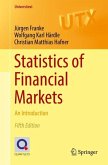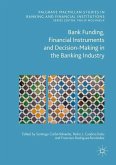International financial markets play an increasing role in the mind of the general public, much more than they did a few decades ago. There can be no doubt that the size of financial markets has grown at a faster pace than the markets for goods and services in the past ten or twenty years. However, it is still unclear whether this is a desirable development, or whether it indicates looming risks. The book documents and classifies the debate about the potential decoupling of the financial sector from the real economy, and then to introduce it into the context of established scientific lines of research. We try to provide a logical structuring of the heterogeneous arguments by postulating a decoupling hypothesis (phenomena, causes, consequences). Various models are presented in this structure and stylized facts can be isolated.
Bitte wählen Sie Ihr Anliegen aus.
Rechnungen
Retourenschein anfordern
Bestellstatus
Storno








